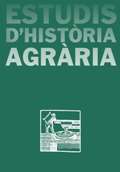Collection and storage of water at the Sanmartí de Serraïma farmhouse (Bages). Sustainable water management for domestic, agricultural and livestock uses in relation to gender
DOI:
https://doi.org/10.1344/eha.2012.24.37-54Keywords:
farm house, collection water, sustainable usage, gender, CatalunyaAbstract
The article explores rationalization and sustainability in the water collection and storage techniques of a farm house inCentral Catalunya. Despite an arid climate and the near total absence of subterranean water resources, the creation of a surface water collection network on a nearby hill allows for the accumulation of a renewable water supply in a pool. The collection of rain water is complemented by the channeling of water from rooftops into an indoor tank and by the existence of an open well located near the house.
These water resources enabled diversified usages linked to domestic, livestock and agricultural activities undertaken by the farm. Women's chores included cleaning, cooking, general hygiene provision and fowl care. Men were in charge of livestock and crop farming and tending the vegetable garden. The article showcases the Sanmartí farm as a successful example of this diverse and disperse system of water collection and sustainable usage.
Downloads
Published
Issue
Section
License
From issue 29 (2017), when submitting a proposal, the author retains the copyright but grants the journal the first publication of the work.
The texts will be disseminated under the Creative Commons licence Attribution Non commercial (CC-BY-NC) which allows the work to be shared with third parties, provided that authorship is acknowledged, the initial publication in this journal, the conditions of the licence are met and no commercial use is made.



